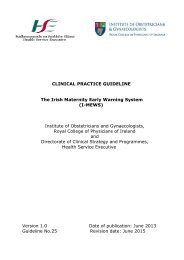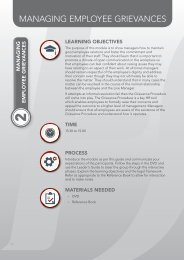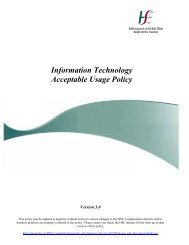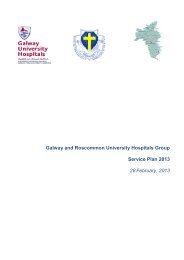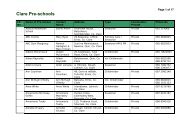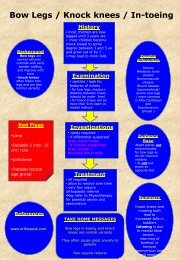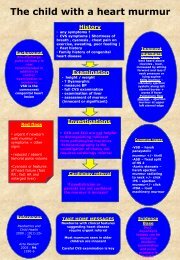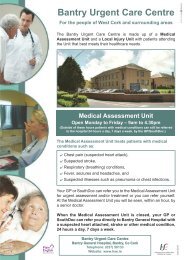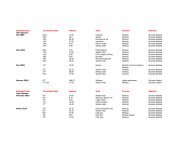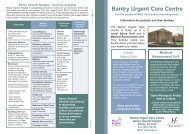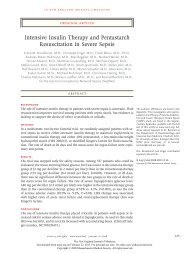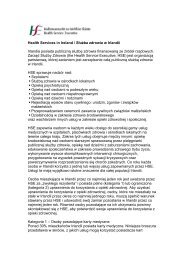Chapter 4 Managing the PRC Meetings - Guidelines for Individuals ...
Chapter 4 Managing the PRC Meetings - Guidelines for Individuals ...
Chapter 4 Managing the PRC Meetings - Guidelines for Individuals ...
You also want an ePaper? Increase the reach of your titles
YUMPU automatically turns print PDFs into web optimized ePapers that Google loves.
<strong>Chapter</strong> 4<br />
<strong>Managing</strong> <strong>the</strong> <strong>PRC</strong> <strong>Meetings</strong> - <strong>Guidelines</strong> <strong>for</strong> <strong>Individuals</strong><br />
In this <strong>Chapter</strong> you will learn about your <strong>PRC</strong> meeting including<br />
How to prepare <strong>for</strong> <strong>the</strong> first, mid cycle & cycle end review meetings<br />
What to expect from <strong>the</strong> meetings<br />
‘If we look <strong>for</strong> success, we will find and create more successes. On <strong>the</strong> contrary, if we<br />
look <strong>for</strong> problems, we will find and create more problems’.<br />
4.0 The purpose of <strong>the</strong> <strong>PRC</strong> meetings is <strong>for</strong> both parties to meet and<br />
discuss, clarify and agree role, key objectives and priorities <strong>for</strong> <strong>the</strong> cycle ahead<br />
discuss resources, risks, supports required<br />
discuss learning and growth requirements<br />
discuss how per<strong>for</strong>mance will be reviewed at <strong>the</strong> end of <strong>the</strong> cycle<br />
4.1 Preparing <strong>for</strong> <strong>the</strong> Per<strong>for</strong>mance Planning and Personal Development Meeting<br />
(Meeting 1)<br />
Ideally <strong>the</strong> cycle is proceeded by a team discussion on <strong>the</strong> unit’s service delivery<br />
requirements contained in <strong>the</strong> current service plan and team skills required <strong>for</strong> <strong>the</strong> coming<br />
year.<br />
4.1.1 Meeting 1 - Part 1: Per<strong>for</strong>mance Planning<br />
In preparation <strong>for</strong> this meeting you might;<br />
Reflect on your own per<strong>for</strong>mance over <strong>the</strong> last period – what areas did you do<br />
well in? What areas did you not do so well in? Can you identify ways you could<br />
improve/things that you would do differently again e.g. are <strong>the</strong>re any gaps in <strong>the</strong><br />
knowledge, skills and/or abilities required to deliver effectively on your objectives?<br />
How will you share this with your manager during <strong>the</strong> meeting? It’s important that<br />
you put some thought into your skill areas in need of development in advance of<br />
<strong>the</strong> meeting so that <strong>the</strong>y can be discussed and prioritised <strong>for</strong> <strong>the</strong> year ahead<br />
during <strong>the</strong> meeting.<br />
Complete sections 1.1 and 1.2 of <strong>the</strong> <strong>PRC</strong> <strong>for</strong>m<br />
V3 20
Were you clear on your per<strong>for</strong>mance standards <strong>for</strong> <strong>the</strong> last period – and if not,<br />
what discussion should you have with your manager this time to ensure clarity in<br />
expectations?<br />
Consider <strong>the</strong> workings of your service/unit over <strong>the</strong> last period – and your<br />
contribution to it. Are <strong>the</strong>re areas that you consider improvements can be made<br />
– and if so, how <strong>the</strong>y might <strong>the</strong>y be achieved? How can you contribute to those<br />
improvements? How do you plan to address this with your manager during <strong>the</strong><br />
meeting?<br />
Are you clear on your role and priorities <strong>for</strong> <strong>the</strong> coming year? You should<br />
consider what you will say when you and your manager are discussing <strong>the</strong><br />
Purpose of post and Priorities section of <strong>the</strong> <strong>PRC</strong> <strong>for</strong>m<br />
In <strong>the</strong> context of <strong>the</strong> service plan what do you consider to be your priority<br />
areas <strong>for</strong> <strong>the</strong> year ahead? What do you see as <strong>the</strong> most important objectives to<br />
be met? What are <strong>the</strong> timescales? What are <strong>the</strong> risks/challenges associated with<br />
you meeting/not meeting those objectives? Consider how <strong>the</strong>se can be addressed<br />
during <strong>the</strong> meeting.<br />
Spend some time familiarising yourself with <strong>the</strong> <strong>PRC</strong> Form and guidelines<br />
on how to complete it (<strong>Chapter</strong> 5). You will need to complete Sections 1.1 & 1.2<br />
in advance of your first meeting.<br />
Ensure that you complete <strong>the</strong> sections of <strong>the</strong> <strong>for</strong>m in enough time so that your<br />
manager has adequate time to review <strong>the</strong>m in advance of <strong>the</strong> meeting<br />
Make sure you have access to any documentation that might be relevant to<br />
<strong>the</strong> discussion with your manager. This will differ from role to role, but it is<br />
important that you both have access to any in<strong>for</strong>mation to be discussed as part of<br />
<strong>the</strong> meeting in advance.<br />
4.1.2 Meeting 1 - Part 2: Personal Development<br />
The purpose of this part of <strong>the</strong> meeting is <strong>for</strong> you to review with your manager any<br />
development needs, personal or professional, required to achieve per<strong>for</strong>mance targets.<br />
This will include:<br />
a review of <strong>the</strong> knowledge, skills and abilities required in your role<br />
a review of your current level of development<br />
service driven CPD or PDP requirements<br />
V3 21
statutory/professional requirements where relevant, e.g. Professional Competency<br />
Scheme <strong>for</strong> registered practitioners under <strong>the</strong> Medical practitioners Act 2007<br />
identification of any knowledge or skills gaps that might benefit from additional<br />
support<br />
In preparation <strong>for</strong> this part of <strong>the</strong> meeting you might:<br />
• Reflect on your strengths and be able to talk about examples of situations where<br />
you demonstrated positive strengths over <strong>the</strong> previous period. You may learn a lot by<br />
exploring a piece of work that went particularly well in <strong>the</strong> last period e.g. by<br />
identifying (1) what actions or behaviours contributed to <strong>the</strong> success (2) how you and<br />
o<strong>the</strong>rs managed <strong>the</strong> situation/worked toge<strong>the</strong>r – this may be very useful in terms of<br />
ensuring positive outcomes <strong>for</strong> similar projects into <strong>the</strong> future.<br />
• Consider your achievements in <strong>the</strong> past and how you might be able to expand on<br />
your strengths and develop your skills fur<strong>the</strong>r in <strong>the</strong> year ahead.<br />
• Reflect on your development needs and reflect on examples of where your<br />
per<strong>for</strong>mance may not have met <strong>the</strong> standard required – what steps can be taken to<br />
ensure that it’s at an appropriate standard next time?<br />
• Reflect on any development opportunities that may present <strong>the</strong>mselves as part of<br />
your role/<strong>the</strong> service plan - is <strong>the</strong>re anything <strong>the</strong>re that you would like to have<br />
exposure to <strong>for</strong> development purposes?<br />
4.2 During <strong>the</strong> Per<strong>for</strong>mance and Personal Development Planning Meeting<br />
What can you expect?<br />
Your manager is encouraged to broadly address <strong>the</strong> following points as part of <strong>the</strong><br />
meeting:<br />
Briefly review and summarise prior meetings when per<strong>for</strong>mance was<br />
discussed and <strong>the</strong> main points of focus that were agreed as a result of those. This<br />
will help to focus <strong>the</strong> meeting and will give you both an opportunity to reflect on<br />
how you have progressed over time<br />
Provide an overview of how <strong>the</strong> unit or department has done overall in <strong>the</strong><br />
last period - what went well, and not so well<br />
What are <strong>the</strong> priorities and challenges are <strong>for</strong> <strong>the</strong> coming year (ref <strong>the</strong> Service<br />
Plan).<br />
V3 22
Discuss <strong>the</strong> per<strong>for</strong>mance management process and how both of you will meet<br />
your responsibilities contained in <strong>the</strong> process<br />
Discuss <strong>the</strong> importance and validity of ongoing two way feedback and agree<br />
to have (potentially) unpleasant conversations if situation demands it<br />
Your manager may discuss with you what motivates you in your role, what you<br />
particularly like about your job and what aspects you dislike or find<br />
particularly challenging. This will provide a useful backdrop/context against<br />
which to review your per<strong>for</strong>mance and will also give your manager in<strong>for</strong>mation in<br />
relation to potential future work responsibilities, development opportunities and<br />
developmental requirements.<br />
Discuss your role and what service driven accountabilities and responsibilities<br />
your manager would like you to do <strong>for</strong> <strong>the</strong> next period<br />
Agree and discuss <strong>the</strong>se accountabilities and responsibilities in more detail;<br />
agreeing <strong>the</strong> specific objectives, per<strong>for</strong>mance standards, timescales, budget and<br />
o<strong>the</strong>r resources available, any potential obstacles and how <strong>the</strong>y might be<br />
overcome<br />
As you progress through this meeting you should classify and enter <strong>the</strong>se<br />
objectives into <strong>the</strong> relevant sections of <strong>the</strong> Action Plan on <strong>the</strong> <strong>PRC</strong> Form.<br />
Complete sections 1.3 and 1.5 of <strong>the</strong> <strong>PRC</strong> <strong>for</strong>m<br />
The objectives selected should reflect a mix of personal ef<strong>for</strong>t and input as well as<br />
personal output indicators and agreed per<strong>for</strong>mance standards. Objectives and<br />
per<strong>for</strong>mance outcomes need to be realistic and achievable but at <strong>the</strong> same time <strong>the</strong>y<br />
should be challenging and serve to raise <strong>the</strong> standard of service provided. See Objective<br />
Setting in Appendix 4.<br />
4.3 Preparation <strong>for</strong> <strong>the</strong> Mid-Cycle Review Meeting (Meeting 2)<br />
The mid-cycle review facilitates a discussion between <strong>the</strong> manager and <strong>the</strong> individual on<br />
<strong>the</strong>:<br />
<strong>the</strong> status of objectives (complete, on target, delayed)<br />
barriers to progress (if applicable)<br />
timescales (pending, cancelled or o<strong>the</strong>rwise revised)<br />
any risks to achieving/not achieving <strong>the</strong> objectives<br />
resources used and/or required<br />
V3 23
training and development or o<strong>the</strong>r support needs<br />
Complete sections 2.1 and 2.2 of <strong>the</strong> PC <strong>for</strong>m and make available to your manager in<br />
advance of <strong>the</strong> meeting. There should no surprises <strong>for</strong> you or your manager at this<br />
meeting if <strong>the</strong> liaison and feedback channels were open between you post Meeting 1.<br />
4.4 Conducting <strong>the</strong> Mid-Cycle Review (Meeting 2)<br />
What can you expect?<br />
Your manager may open this meeting with a quick update on organisation/unit/team<br />
priorities/changes in priority since you last met.<br />
She/he will continue with a review of progress made in <strong>the</strong> last period and discuss and<br />
agree actions to address any issues arising/agree approach to dealing with new<br />
priorities/challenges that have arisen since. You can amend your Action Plan on <strong>the</strong> <strong>PRC</strong><br />
Form to reflect any changes agreed.<br />
4.5 Preparing <strong>for</strong> <strong>the</strong> Cycle End Per<strong>for</strong>mance Review & Developmental<br />
Evaluation Meeting (Meeting 3)<br />
This end of cycle meeting is an opportunity <strong>for</strong> you to <strong>for</strong>mally review your achievements<br />
and development over <strong>the</strong> previous 12 months with your manager. As we know,<br />
per<strong>for</strong>mance reviews are most productive when <strong>the</strong>y are a collaborative process, both<br />
parties have prepared <strong>for</strong> <strong>the</strong> meeting and <strong>the</strong>re have been ongoing per<strong>for</strong>mance<br />
discussions and feedback exchanges during <strong>the</strong> year. There should be ‘no surprises’ <strong>for</strong><br />
you at this review – any issues that arose should have been addressed as <strong>the</strong>y happen<br />
during <strong>the</strong> year<br />
Preparation:<br />
Ensure that you know well in advance <strong>the</strong> date, time and venue <strong>for</strong> <strong>the</strong> meeting<br />
You should have completed, and submitted to your manager, Sections 3.1 of <strong>the</strong><br />
<strong>PRC</strong> Form so that <strong>the</strong>y have an opportunity to reflect on it in advance of <strong>the</strong><br />
meeting,<br />
V3 24
4.6 Conducting <strong>the</strong> Cycle End Per<strong>for</strong>mance Review & Developmental Evaluation<br />
Meeting (Meeting 3)<br />
What can you expect?<br />
This is <strong>the</strong> <strong>for</strong>mal review of your achievements and development over <strong>the</strong> previous 12<br />
months. Your manager will encourage you to discuss those aspects of your work that<br />
worked particularly well over <strong>the</strong> last period and will encourage you to reflect on what<br />
enabled <strong>the</strong> successful outcome. The idea is to find out about what things are working<br />
well and why, so that you/<strong>the</strong> organisation can do more of it. Of course, <strong>the</strong> discussion<br />
may also focus on aspects of work that did not work well in an attempt to identify <strong>the</strong><br />
factors that effected per<strong>for</strong>mance. (See <strong>Chapter</strong> 6, Feedback and Engagement).<br />
Your manager is encouraged to broadly address <strong>the</strong> following points as part of <strong>the</strong><br />
meeting:<br />
Agree <strong>the</strong> agenda<br />
Review <strong>the</strong> progress on objectives since <strong>the</strong> last meeting. You and your<br />
manager are both encouraged to reflect on specific examples of good<br />
per<strong>for</strong>mance or underper<strong>for</strong>mance, and <strong>the</strong> impact of that on your work<br />
You/your manager may wish to explore in more detail <strong>the</strong> reason <strong>for</strong> <strong>the</strong> good<br />
per<strong>for</strong>mance or underper<strong>for</strong>mance e.g. was it to do with your skill/ability, your<br />
knowledge of <strong>the</strong> job, your motivation/interest in <strong>the</strong> job, your confidence levels or<br />
were <strong>the</strong>re extraneous factors contributing to <strong>the</strong> underper<strong>for</strong>mance.<br />
Your manager may also wish to discuss “stretch and grow” objectives with you.<br />
These will provide you with fur<strong>the</strong>r opportunities <strong>for</strong> development e.g. getting<br />
involved in a new project, job rotation, leading a new team, new responsibilities<br />
etc.<br />
It is important that you understand when and where you were perceived to<br />
have achieved or underper<strong>for</strong>med and <strong>the</strong> impact of that on <strong>the</strong> task at<br />
hand/team/unit/wider organisational objectives. It is important that you agree with<br />
your manager how any underper<strong>for</strong>mance can be improved upon.<br />
Learning and Growth needs will also be discussed and this is an opportunity <strong>for</strong><br />
you to identify specific learning and growth needs that can be addressed in <strong>the</strong><br />
following year.<br />
V3 25
You may wish to provide feedback to your manager on how <strong>the</strong> communication/working<br />
relationship between you may be enhanced. It is important that you plan how you are<br />
going to approach this conversation in advance of <strong>the</strong> meeting.<br />
At <strong>the</strong> end of <strong>the</strong> meeting:<br />
Agree a summary of <strong>the</strong> main points discussed and <strong>the</strong> actions agreed<br />
Establish <strong>the</strong> immediate next steps<br />
Agree <strong>the</strong> time and date of <strong>the</strong> any follow up activities<br />
If it is a case that you are found to be continuously underper<strong>for</strong>ming, despite having<br />
received additional support/development, you may be required to participate in a<br />
Per<strong>for</strong>mance Improvement Process (PIP). There is more on this in <strong>Chapter</strong> 7<br />
V3 26



